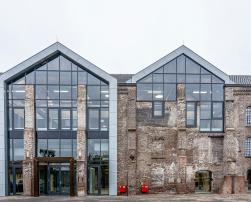
Energy savings with eco-efficient ZS ceramic bricks
The study demonstrates that using eco-efficient ZS ceramic bricks in building construction can reduce energy consumption by up to 12.5% compared to conventional bricks, with or without thermal insulation, in various climates.

Optimising relocatable modular building management with digital twin technology
This study presents a Digital Twin-based system integrating Building Information Modeling (BIM), Internet of Things (IoT), and Geographic Information Systems (GIS) to optimise the allocation, management, and lifecycle of relocatable modular buildings, reducing costs and improving efficiency.

ACE’s document promoting renovation over new builds
The document advocates for renovating existing buildings to meet the EU’s 2030 GHG emission reduction target, emphasising energy efficiency, reuse and social inclusion.

Decarbonising the existing building in UK to achieve net-zero: challenges and opportunities
The document highlights the need to reduce greenhouse gas emissions from buildings through retrofitting, addressing challenges such as high costs, data gaps, and technical issues, while exploring opportunities in innovation and policy to meet net-zero targets by 2050.

Boosting energy-efficient homes: the impact of Energy Performance Certificates in Europe
This review examines European research on the price premium of energy-efficient homes, finding positive effects but highlighting challenges like data limitations and omitted variable bias, with recommendations for improved data infrastructure and tailored policies.

Low-carbon management in construction: an AHP model and case study
This study develops a low-carbon production management model for construction firms using the Analytic Hierarchy Process (AHP) to address carbon emissions and provide practical guidance for a low-carbon transition in the industry.

The potential of bamboo in construction
This review explores the potential of timber bamboo as a sustainable construction material, emphasising its carbon-capturing properties and the need for cost competitiveness to drive widespread adoption and significant climate benefits.

Optimising building insulation for energy efficiency and sustainability: a BIM-based simulation study
This research explores BIM-based simulations to optimise building insulation, finding urethane foam as the most effective and eco-friendly option for enhancing energy efficiency, reducing costs, and minimising CO2 emissions in Japanese apartments.

Balancing historical preservation and energy efficiency in Poland's churches
The article examines the energy efficiency challenges in historical churches in central Poland, highlighting the difficulty of aligning them with modern sustainability goals while preserving their historical significance.

When past and present meet: adaptive reuse for sustainable workspaces
This study explores how adapting historic buildings, like Erbil Citadel houses, into sustainable office spaces enhances employee satisfaction, creativity, and well-being while balancing heritage preservation with modern needs.